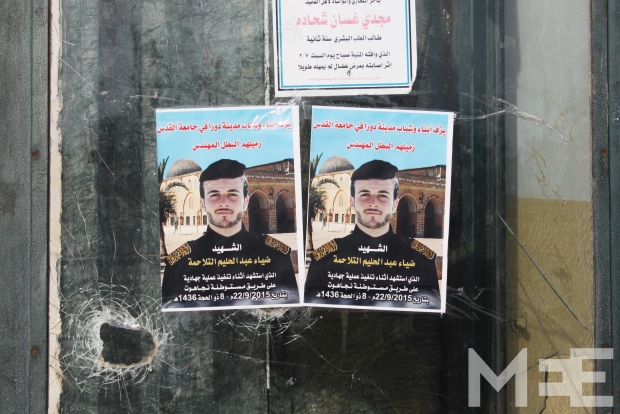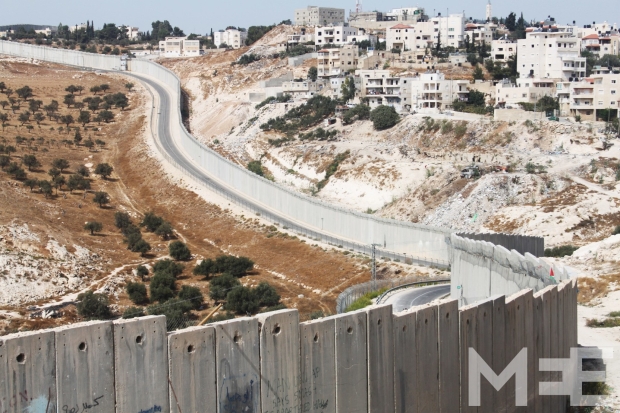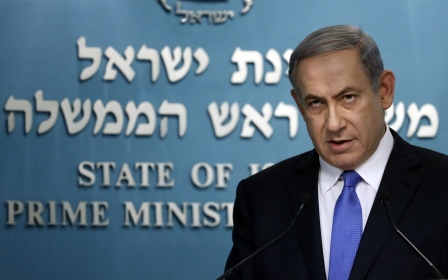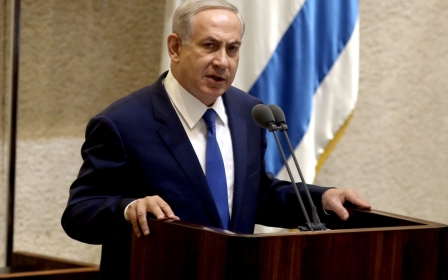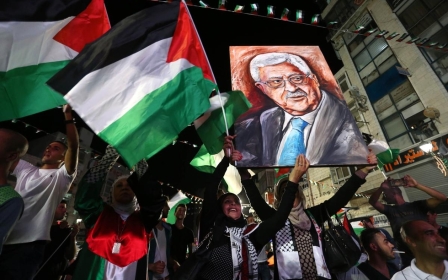Palestinian students on the frontline amid daily violence
ABU DIS, Occupied Palestinian Territories - East Jerusalem’s al-Quds University has found itself in the heart of the latest flare-up in violence between Israelis and Palestinians. With its four campuses straddling both sides of the separation barrier, the university – East Jerusalem’s only higher education institution – has long been at the heart of tensions but the last few weeks have been particularly hard for the 12,000 students and staff. Its campuses have been routinely raided by Israeli military forces, with dozens of students injured in clashes. Several students have also been detained, while three have been shot dead after allegedly trying to carry out attacks.
At the main AQU campus in Abu Dis, where most classes have been held since the 2nd Intifada, students often sit and talk as the gold-plated Dome of the Rock can be seen glistening on the horizon beyond the Israeli separation wall that leads to the university.
A section of the wall, blackened by burning tires and debris from recent clashes, has visible pockmarks from where hundreds of demonstrators took sledgehammers to the structure weeks earlier as frustrations over restrictions on movement and access to the holy site, just three kilometres away, boiled over.
The campus entrance is littered with rocks and tear gas canisters that serve as remnants of daily confrontations with Israeli military. Broken plant pots and glass also lay scattered on the ground for days after Israeli security services raided the university buildings, and detained eight students.
The daily violence, which has continued unabated since the beginning of October, is a regular topic of discussion for students, scarring each individual life in its own way.
“I didn’t feel what was going on until someone I worked with was shot and killed,” Basher, a media student from Qalandiya refugee camp, tells Middle East Eye.
“That moment I felt different. I had heard of martyrs but once it gets close you really get a different view of things; it kind of stings you.”
A poster of Diaa Talahmeh, a 21-year-old computer studies student at Al-Quds, is ubiquitous across the campus.
His image, in military fatigues with the Al-Aqsa Mosque in the background, is a reminder of the wider conflict beyond the university gates, and the impact of the escalation in violence.
The poster says he died in a “military operation” on 22 September, although the cause of death has been disputed by Israeli and Palestinian officials.
Two weeks later, his friend and fellow Al-Quds student Muhannad Halabi, 19, stabbed and killed two Israelis in the Old City of Jerusalem before being shot dead.
Before he died, the law student’s Facebook profile picture had been changed to a photo of his friend Diaa.
The latest incident involving a student was on 26 October, as a Palestinian student from the southern West Bank town of Sair was shot dead after reportedly stabbing an Israeli soldier in northern Hebron.
The death of students following alleged attacks reverberates across the university, as once-familiar faces on campus are now immortalised on the posters of martyrs.
Ahmad, an English literature student from Hebron, knows the feeling of loss well.
A friend he is sitting with outside the student cafe, wearing dark glasses and softly playing the Oud, is finding it difficult to cope following the killing of a beloved friend.
“There was a martyr in Duheisha camp, Mutaz, he’s the closest friend to this guy. We’ve been discussing it for nearly four hours today. It’s really hard to even openly talk about it,” Ahmad says.
“He was a great guy. Everyone loved him, but he’s gone.”
Students regularly discuss the ongoing violence and what it means for Palestinian national aspirations. The involvement of students in attacks - people they knew - is something everyone is aware of.
“Everyone is talking about them (Talahmeh and Halabi). Most of the people feel like they want to interact with that and be one of the guys actually,” Sabi, a 24-year-old media student from Eizariya, tells MEE.
“It’s everywhere, and that’s good. If I were to call it something I would not call it a third intifada, even though I wish it happened. When you say Intifada it has to be organised, and well organised, and we lack that.”
Ahmad says it is a revolution of the people, without the interference of the Palestinian leadership, something he views as wholly positive.
“The drummers - the clappers as we call them, the people who justify the position that the PA takes - have disappeared,” he says.
“I am ashamed of Oslo. The security forces are tied to security coordination. Most people call it treason.”
Those very security arrangements were exposed in plain sight for students as the university welcomed the Indian president on 13 October, amid the presence of hundreds of heavily armed PA security forces driving around with guns.
An hour or so after the visit, once the Indian president had left, Israeli soldiers raided the campus and detained several students and staff.
“As a Palestinian I don’t want to live without dignity,” Ahmad says.
“There was no occupation that lasted forever. Maybe not now, maybe not tomorrow, maybe after I die, but it will end. Maybe I won’t be a witness, but it will.
“I believe in that.”
‘Collective punishment’
The location of the Abu Dis campus means students from Jerusalem and areas of the northern and southern West Bank attend classes at the university, creating a platform for sharing ideas about and experiences of the Israeli occupation.
But the daily violence and heightened security restrictions have in recent weeks severely affected the students’ ability to collectively meet.
“This is a university, the place we are supposed to be educated, not attacked by the [Israeli] military,” Ahmad, from Hebron, tells MEE.
“The current situation is pretty harsh. There is strike after strike and we have to evacuate the campus during clashes. I have a lecture in al-Quds main campus, and it’s been two weeks since I had that class.”
Bashar from Qalandiya refugee camp says he has been trying to produce a university radio show for three weeks, but none of his team has been able to make it to campus on the same day.
“Either the roads are blocked or the campus is evacuated due to clashes. The army invades the campus and everybody goes back to their town,” the media student says in frustration.
“But even when students gather to take taxis home, you still get tear-gassed.”
The weeks of clashes following a surge in violence in the West Bank, East Jerusalem and Israel, have made it virtually impossible for the university to function.
Brendan Browne, a visiting assistant professor at al-Quds Bard, says nearly all of his classes have been cancelled since 1 October, with exams postponed amid disruptions to the syllabus.
Students are angry they are missing classes, Browne says, with many feeling that they have been left behind by the international community.
Student volunteers with the Red Crescent barely get a moment’s rest on the campus, let alone a chance to attend lectures if they are on, as they run to treat other students for tear gas inhalation in what is now a routine procedure.
Sabi, from Eizariya, says he respects the work the volunteer medics do, but is fed up with the daily disruptions to student life.
“Obviously it’s collective punishment,” he says. “We pay money and it takes effort for us to get here. Then we have to leave the campus and go breathe tear gas or eat bullets.”
Bashar says that Israel resents the students’ presence on the Abu Dis campus due to it being on the border of East Jerusalem and the West Bank.
He was stopped recently at the container checkpoint that splits the northern and southern West Bank and forced to recite a rhyme praising the Israeli border police under the threat of arrest.
“The soldier wanted me to admit in front of everyone that it’s not Al-Quds University it’s Abu Dis University. They hate even the name because it symbolises Jerusalem and nationalism,” he says.
“He humiliated me, and I was just going home.”
Studying under siege
Since violence escalated in October, Israel has imposed tight restrictions throughout East Jerusalem and the rest of the occupied West Bank, severely affecting the ability of students to make it to campus in the hope that classes have not been cancelled.
“It’s hard to get to the college, if I had a lecture at 8 am I would never make it from Hebron,” Ahmad says.
“The transportation starts at 6, but there is the container checkpoint which splits the West Bank. Sometimes they stop us for hours. It’s really hard.”
Israeli forces often stop Palestinian buses at checkpoints, Ahmad says, with students routinely searched.
“It happens in a humiliating way, because the guys have to be searched naked sometimes. It’s harmful.”
Sabi says the restrictions and clashes are a waste of time for the students, and an abuse of students’ rights.
“This is the way they react to us. It’s violent and abusive, but what can we do as students? I think just by coming here and sitting down on our chairs as students we are saying that we have something to defend.”
Assistant professor Brendan Browne says he supports the students in their desire to continue as normal, pointing to the example of how Palestinian students risked their lives to reach their universities during the Second Intifada.
“We have to try and go on as normal, because if we stop, if we shut down this institution, or we don’t keep doing what we’re doing, they’ve won, the Israelis have won.”
Ahmad agrees: “Even if there is a strike, even if I am scared, even if the road is blocked, I will try to get to school. I have to come, because this is my own way to show that I am resisting, that I am here.”
New MEE newsletter: Jerusalem Dispatch
Sign up to get the latest insights and analysis on Israel-Palestine, alongside Turkey Unpacked and other MEE newsletters
Middle East Eye delivers independent and unrivalled coverage and analysis of the Middle East, North Africa and beyond. To learn more about republishing this content and the associated fees, please fill out this form. More about MEE can be found here.


